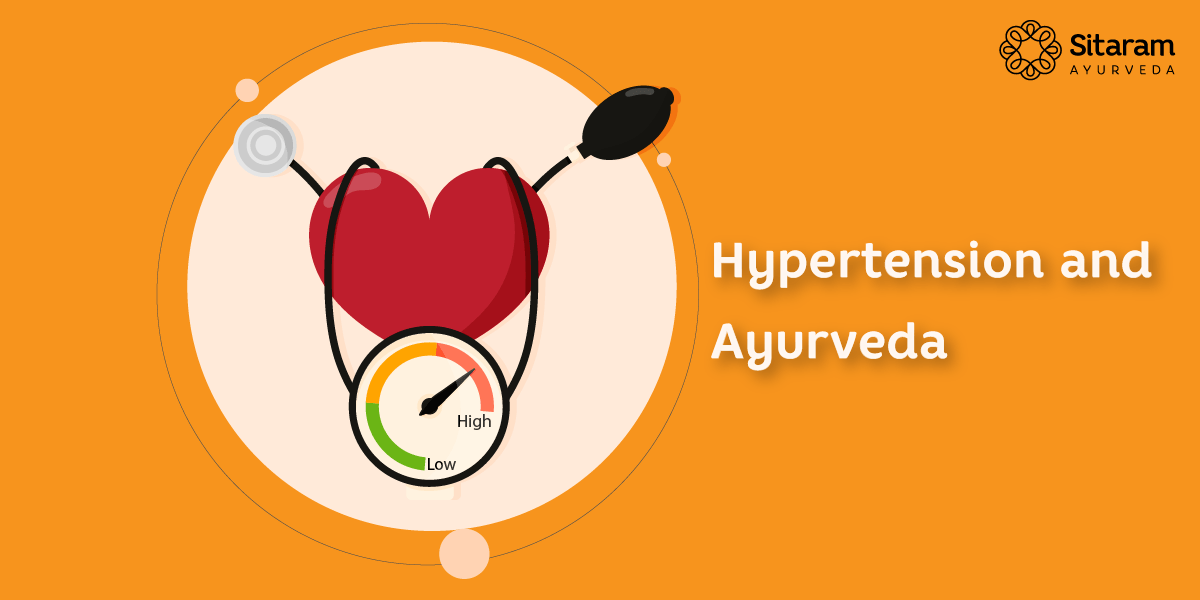Hypertension and Ayurveda

What is Hypertension?
Hypertension occurs when the blood pressure increases to an unhealthy level. High blood pressure eventually causes other health problems. The blood pressure reading is measured in millimeters of mercury (mm of Hg). The top number indicates systolic pressure, while the bottom indicates diastolic pressure.
Normal Blood Pressure
Normal blood pressure is in a range of 120/80 mm of Hg.
Prehypertension is systolic ranges between 120 to 139 and diastolic between 80-89 mm of Hg.
Hypertension is where the systolic pressure is above 140 mm of Hg and diastolic above 90 mm of Hg.
Prevalence of Hypertension
- 33% of urban and 25% of the rural population are hypertensive
- Prevalence rises as age advances
- 57% of stroke deaths happen due to hypertension
- 24% of coronary diseases heart are due to hypertension
Types of Hypertension
Primary or Essential hypertension
Secondary hypertension- is caused as a result of other medical conditions.
Causes of Essential Hypertension
Essential hypertension tends to develop gradually over the years. Primary hypertension is closely associated with age and genetic factors.
Causes of Secondary Hypertension
- Kidney diseases – Polycystic kidney, parenchymal diseases
- Adrenal causes – Cushing’s syndrome
- Thyroid problems- hyperthyroidism, hypothyroidism
- Obstructive sleep apnea
- Certain medications- Some decongestants, anti-depressants, birth control pills, immunosuppressant
Risk Factors for Hypertension
- Excessive sodium consumption
- Insufficient intake of dietary potassium
- Overweight and obesity
- Alcohol intake
- Physical inactivity
- Genetic predisposition
Signs and Symptoms
Hypertension is usually asymptomatic until some major incidents like stroke or heart attack happen. Hence hypertension is referred to as a ‘silent killer’.
Commonly presented symptoms are:
- Headache
- Dizziness
- Palpitations
- Chest pain
- Fatigue
- Difficulty in breathing
- Nose bleed
Complications of Hypertension
Uncontrolled hypertension leads to an increased chance of
- Stroke
- Cardiovascular diseases
- Kidney diseases
- Metabolic syndrome
Benefits of Treating Hypertension
Clinical studies show that treating hypertension helps in
- 50% reduced risk of heart failure.
- 30% reduced risk of stroke.
- 15% reduced risk of myocardial infarction.
- 10% reduction in the risk of death.
How Ayurveda helps?
Ayurveda doesn’t precisely name’ hypertension’. Instead explains conditions similar to that of increased blood pressure. The symptoms of hypertension are described under various medical conditions. That allows Ayurveda to view hypertension more holistically. The causes and the symptoms are thus dealt with in a more detailed and subtle manner. The medical approach to treat hypertension is detailed below:
a) Diet
Diet plays as much importance as medicine in Ayurveda in regulating hypertension:
- Reduce excessive salt intake
- Eat more fruits and vegetables.
- Try to include all the six tastes( Shad rasa) in your daily food.
- The ‘DASH’ diet (Dietary Approaches to stop hypertension) is advised for hypertension – Diet rich in fruits, vegetables and whole grains, low-fat dairy products, fish, beans and nuts.
- Stick on to the diet pattern continuously
- Try to avoid all food incompatibilities like milk and fish, sour fruits and milk, heated honey, honey and ghee mixed in equal quantities
- Studies show regulated fasting help in reducing blood pressure
b) Avoid Mental Stress
Studies show that mental stress is one of the leading causes of hypertension. Therefore proper counseling, stress relief, Yoga, meditations will help. Practices like Pranayama, Yoga Asanas were found beneficial.
c) Avoid Smoking and Alcohol Intake
d) Proper Exercise
- Regular, proper exercise makes your heart stronger.
e) Sleep
- Try to have a night of proper sleep at night for at least seven hours.
- Avoid day sleep except in the summer season.
f) Non-suppression of Natural Urges
Ayurveda explains natural urges. They are of two types
a) suppressing urges.
b) non-suppressing urges.
The former includes greed, anger, envy, fear, and ego. The latter includes bodily urges like hunger, thirst, sleep, bladder-bowel reflexes, etc. Suppression of these physical urges can cause serious health problems.
g) Ayurvedic Medications
Many Ayurvedic medications help to reduce high blood pressure. But this has to be taken only under medical supervision.
Decoctions(Kashayam)- Gandharvahasthadi Kashayam, Ashtavargam Kashayam, Chirivilwadi Kashayam, Nayopayam Kashayam
Powder (Choorna) – Vaiswanara Choornam, Avipathi Choornam
Tablets (Gulika) – Yogarajaguggulu, Kaisoraguggulu
Medicated ghee (Ghrutham)- Kalyanakam Ghrutham, Vidaryadi Ghrutha
Rasayana (rejuvenating drugs)- Proper use of Rasayana drugs like Aswagandha Choornam, Triphala capsule, Chyavanaprasham increases the body strength.
h) Treatment
- Sirodhara: Sirodhara is an excellent stress relieving procedure. Studies show that Sirodhara plays a vital role in regulating hypertension.
- Panchakarma (purification) procedure: Panchakarma includes five detoxification procedures(medicated enema, medicine induced vomiting, drug-induced purgation and bloodletting). A proper approach under medical guidance helps in regulating blood pressure.
To buy Aswagandha Choornam Online: https://www.sitaramayurveda.com/product/aswagandha/
To buy Triphala Capsule Online: https://www.sitaramayurveda.com/product/triphala/
To buy Chyavanaprasa Online: https://www.sitaramayurveda.com/product/chyavanaprasa/
To buy Kalyanakam Kashaya Online: https://www.sitaramayurveda.com/product/kalyanakam-kashaya/
To buy Vidaryadi Kashaya Online: https://www.sitaramayurveda.com/product/vidaryadi-kashayam/
To buy Ashtavargam Kashayam Online: https://www.sitaramayurveda.com/product/ashtavargam-kashaya/
To buy Gandharvahasthadi Kashayam Online: https://www.sitaramayurveda.com/product/gandharvahastadi-kashaya/


 Sign In
Sign In Cart
Cart
Thank you for sharing this wonderful information! in addition to being incredibly educational
Thank you for sharing! in addition to a highly useful post